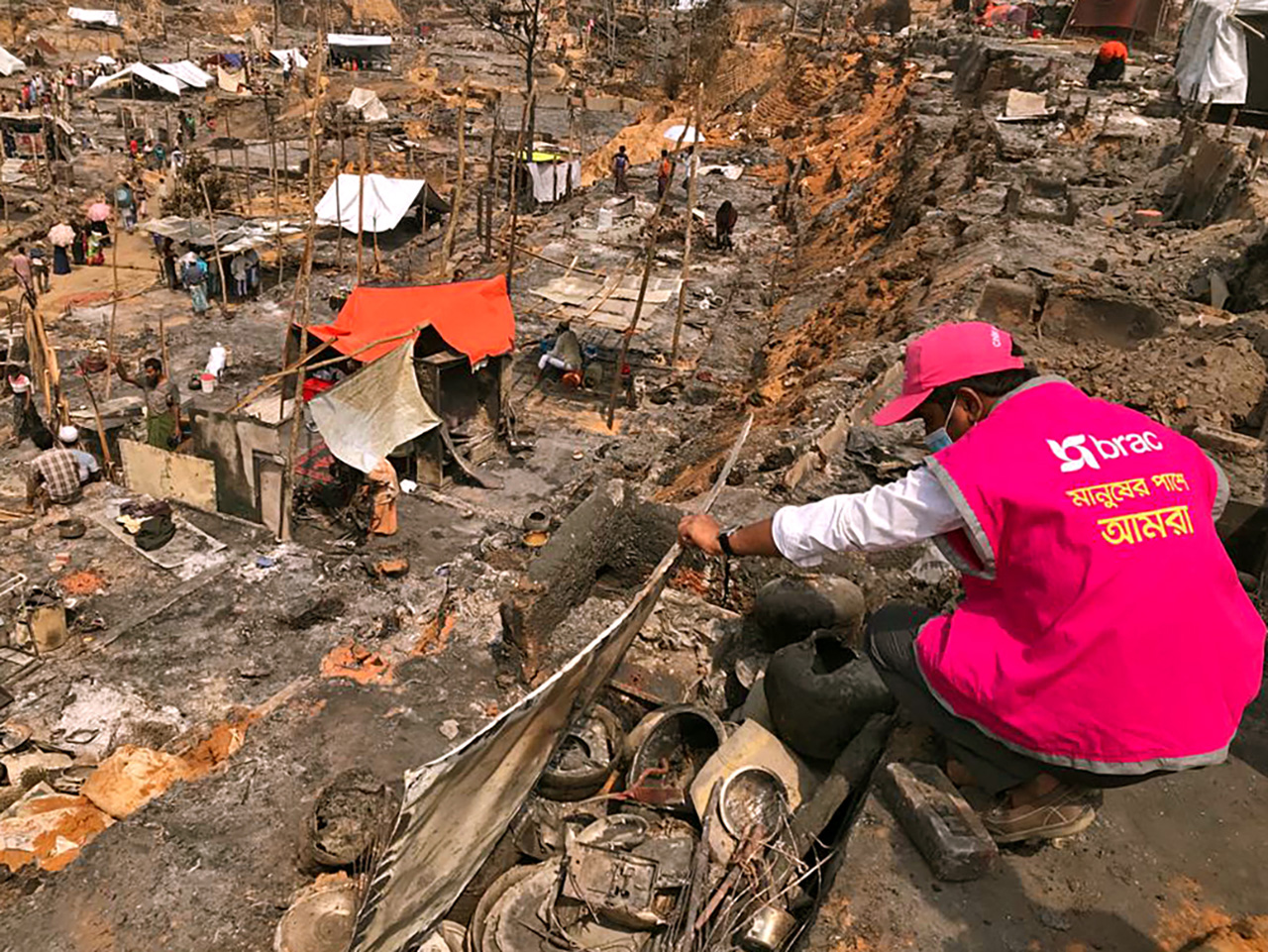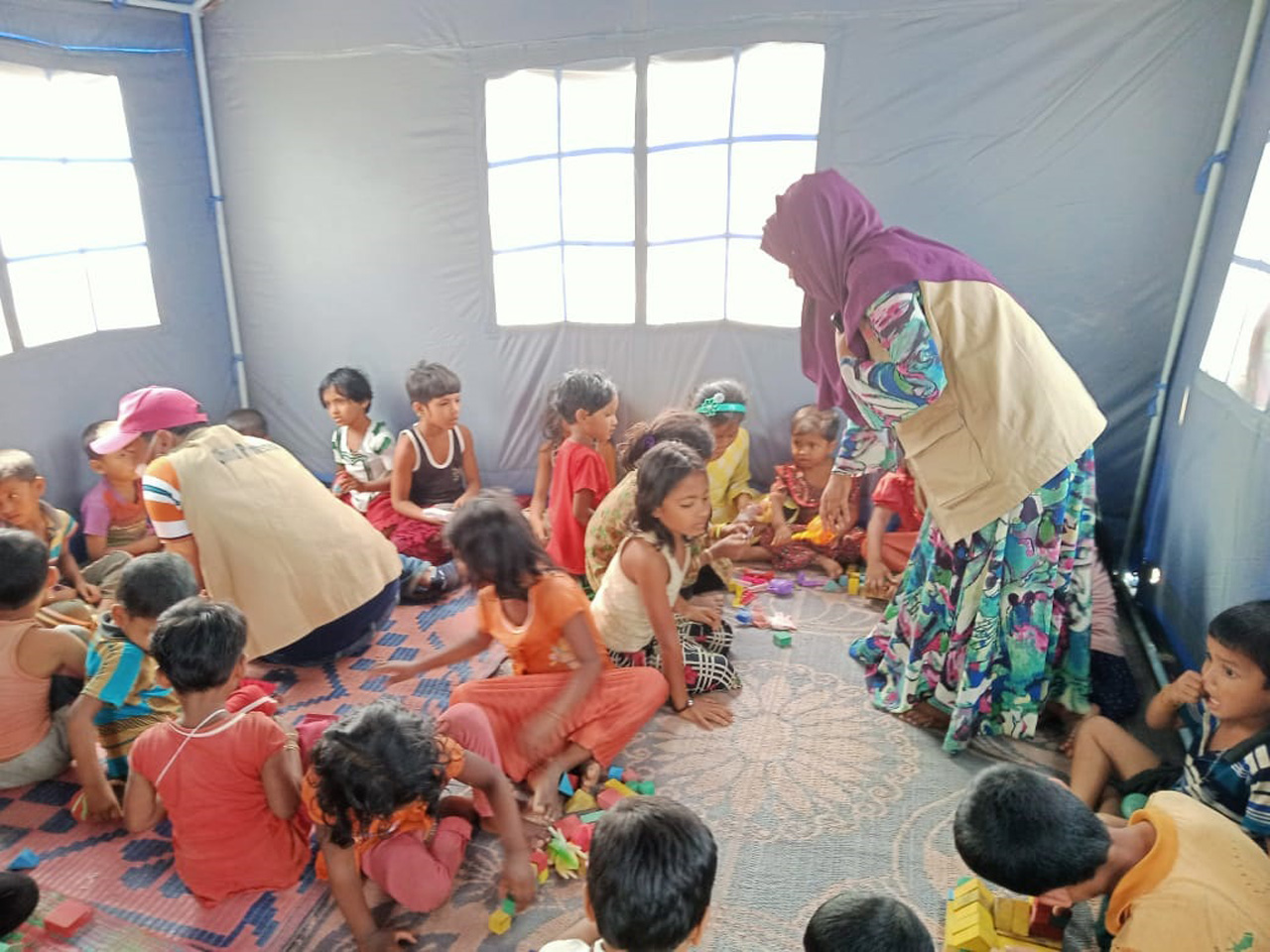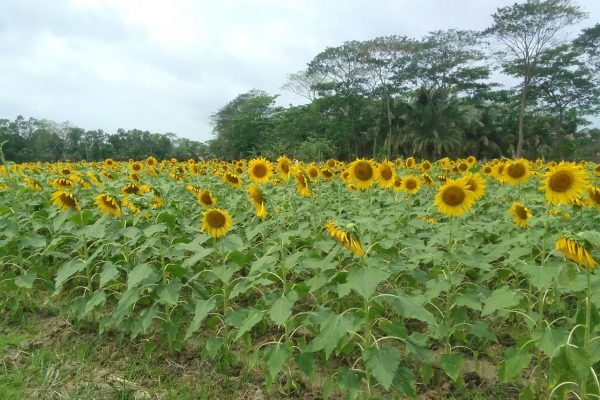‘Sisters of peace’: The women supporting mental health in Bangladesh’s Rohingya camps
Reading Time: 4 minutes
The Rohingya population had to flee some of the worst forms of persecution when they left Myanmar in 2017. Since then, living in the world’s largest makeshift settlement situated at the edge of Bangladesh in Cox’s Bazar has meant facing new forms of challenges – floods, cyclones, landslides and fires – often adding to their losses and layers of trauma.
Shantir apa (sisters of peace) are leading a quiet revolution within the Rohingya camps. To help families strengthen their capacities to cope, they are ensuring an empathetic space to decompress and manage mental distress.
On 22 March 2021, an estimated 48,000 Rohingya individuals looked on as everything they owned was reduced to ashes.
The immediate response to the devastating fire, which tore down nearly an entire camp, involved ensuring accommodation, food and medical supplies for the survivors. Infrastructure was gradually rebuilt over time, but the trauma that the Rohingya persistently lived with remained.

Photo Credit:©BRAC
Psychological first aid and psychosocial support is not only just as important as ensuring basic health, it is a crucial intervention. The reason for this is simple – there can be no health without mental health. For the people in the Rohingya community, who had fled violence, been displaced, come to a new country, and then experienced the extreme weather events in the makeshift camps of the coastal region, mental health care cannot be overlooked.
Read more: Walking through the remains of the Balukhali Rohingya camp
Mental health support: a basic need
Most people affected by emergencies such as the events leading to the Rohingya exodus tend to experience severe distress well after the events have passed. However, the prevalence of trauma responses such as depression and anxiety is projected to rise drastically during a humanitarian crisis.
A World Health Organization’s review shows that one in five people who have experienced war or other forms of conflict are likely to develop depression, anxiety, post-traumatic stress disorder, bipolar disorder, schizophrenia or other forms of mental illnesses.
Read more: Tackling the mental health crisis during a disaster
Displaced communities affected by the trauma from being witnesses to violence and conflict are especially vulnerable during and after emergencies. Therefore, ensuring access to basic needs and clinical care for their mental wellbeing is vital.

Photo credit: ©BRAC
These services can be provided under various umbrellas, depending on the extent of support needed, or with already available resources such as community self-help groups, psychological first-aid, basic clinical mental health care, psychological interventions, links and referral mechanisms, and the continuous protection and promotion of rights of the people concerned.
Challenges in the Rohingya camps
Addressing mental health and psychosocial needs is crucial towards building resilience and ensuring the wellbeing of the Rohingya population in the camps of Cox’s Bazar, Bangladesh. Lack of information and preconceived notions serve as significant barriers to the people coming forth and seeking help.
Read more: Addressing the impact of COVID-19 on infants and young children
In communities ridden with such misconceptions, it is often a challenge to address the needs of the community while trying to build a relationship with them, especially with children. In the densely populated Rohingya camps, where family members often have to share rooms with six or seven other families, lack of personal space and confidentiality are also key issues.
Although Rohingya men are most often the decision makers in their families and communities, they themselves are also victims of trauma and abuse. However, patriarchal norms and notions of masculinity force these men into adamant silences when it comes to addressing their mental health and wellbeing, further perpetuating the stigma.
The Rohingya displacement from Myanmar to Bangladesh saw a large population of young mothers and children entering the country who had witnessed firsthand the horrors of conflict and persecution. As a result, conversations with these individuals require greater nuance and delicacy as issues of unresolved trauma, depression and fear continue to linger within like a fresh wound. A study conducted in February-March 2020 found that 17.39% of Rohingya mothers had moderate to severe levels of depression.
A model that holds space
The 4-tier BRAC mental health and psychosocial support referral pathway model, also known as the para-counselor model, uses interventions based on specifically designed psychosocial support to enable people to manage daily symptoms of mental distress.
The model employs core engagement skills of active listening, empathy and practising a non-judgmental attitude. It recognises the importance of confidential, safe spaces for people and the necessity of regular, reflective supervision for guidance and support.
Within the Rohingya community, para-counselors are informally known as shantir apa (sister of peace). Shantir apas are trained extensively on ethical boundaries, confidentiality, empathetic listening, in-depth observational skills, basic communication skills, home-based care and psychosocial support. They are also trained to identify critical cases to refer to psychologists. The system has integrated, community-based mental health and psychosocial support services, as well as individual counseling services, when needed.
Support systems include on-the-ground support from barefoot counselors, which includes daily phone calls and weekly in-person supervision from counselling psychologists. A clear onward referral system is present for complex cases that require clinical psychology or psychiatry, clinical and risk assessment, formulation and intervention.
Through its nine centres spanned across the camps, the system has already benefited nearly 100,000 people.
Mental health support in emergencies and beyond
Mental health requires specialised support and uninterrupted services, irrespective of a humanitarian emergency or pandemic. Low-cost, high-impact models such as BRAC’s paracounsellor model, or BRAC’s telecounselling model Pashe Achi are great examples of how we can continue to work with those who need these services the most.
Recent studies show a rising rate of mental health cases in Bangladesh, with nearly 17% of adults in Bangladesh suffering from mental health issues. The figures confirm a disproportion with the mental health services and experts available.
Strengthening mental health services in all contexts, building community-based support approaches, while investing in the adoption of effective systems for integration of clinical services with health systems, are some of the key pathways for us to have a more prepared response to the emerging public health crises.
Shaheen Nafisa Siddique is a psychologist, and head of mental health and psychosocial support, BRAC Institute of Education and Development
BRAC Institute of Educational Development (BRAC IED) has been an active advocate and proponent of contributing to the development of education from a holistic perspective through professional development, capacity building, skills development, training and research. The Institute aims to tap into emerging areas of development by exploring areas including early years’ learning & early childhood development, play-based learning methodology, psychosocial wellbeing of stakeholders from diverse socio-economic backgrounds, adolescent mental health, Primary and Secondary education and curriculum & textbook design.
BRAC Humanitarian Crisis Management Programme (HCMP) has been working to ensure basic needs, safety and security, socio-economic opportunities in the camps and the host community for more than 1.3 million people, after an influx of forcibly displaced Myanmar nationals took refuge in Cox’s Bazar, Bangladesh.
Cover Photo: ©BRAC





